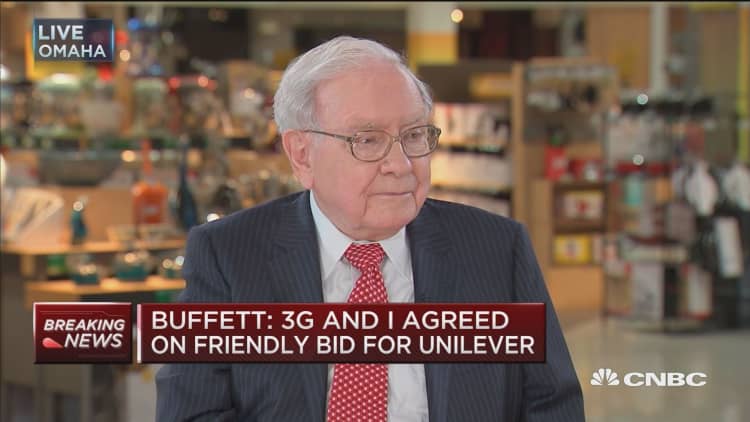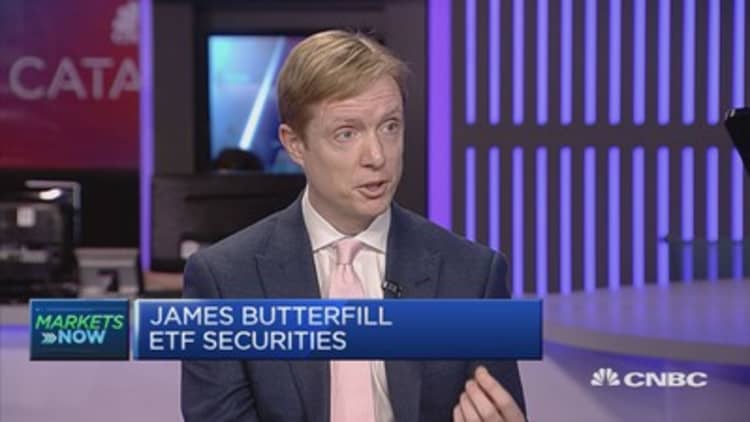U.S. food giant Kraft Heinz, still smarting from its failed takeover bid for Europe's Unilever, is on the prowl for its next target and more names are being mentioned as possibilities, according to a new report.
"This is not the last M&A play we are likely to see from Kraft Heinz," said S&P Global Ratings analyst Bea Chiem. "Consequently, the most frequent questions we receive concerning the U.S. packaged food sector concern Kraft Heinz."
In a report issued Monday, S&P said there are "attractive targets" for Kraft Heinz that include Mondelez International, General Mills, Kellogg, Campbell Soup as well as Colgate-Palmolive and Kimberly-Clark. It adds that "PepsiCo would be a stretch given its entrenched management team," although Bernstein in a research note Monday said a "Kraft-Heinz PepsiCo tie-up might be one of the most likely."
Bernstein's analyst Pablo Zuanic's report points out that 3G and Berkshire Hathaway would need to come up with around $70 billion of equity if they wanted to maintain control of the merged entity. However, a PepsiCo deal by Kraft Heinz also could present other issues for Berkshire Hathaway given it's already a major investor in rival Coca-Cola.
Indeed, there's been a lot of buzz in recent months on possible merger and acquisitions involving Heinz Kraft and its deep-pocketed investors. But many rumored or announced deals have fizzled.
3G, or affiliates of the buyout firm, previously have invested in companies such as Kraft Heinz, Burger King, Tim Hortons and Anheuser-Busch. The attempt to buy Unilever earlier this year came at a time when Kraft Heinz's business was struggling with lackluster results, and that trend has continued.

"Kraft Heinz unintentionally showed its cards when its $143 billion bid for Unilever leaked to the public in February 2017," S&P said in its report.
According to S&P, the failed Unilever bid was evidence Kraft Heinz was hungry for a large asset to boost its revenue growth as well as "revealed the company's ambition of becoming a behemoth consumer packaged goods company run the 3G way, a lean juggernaut with ambitious cost cutting plans and zero-based budgeting."
The zero-based budgeting is a fundamental part of 3G's cost-reduction focus and strategy of delivering results by justifying expenses for every new budget period. This approach has caught on not just with food manufacturers tied to 3G but has been done at Campbell Soup too.
"In our opinion, Mondelez looks the most attractive among the packaged food companies and Colgate-Palmolive is the most attractive within household products and personal care," said S&P.
Added S&P: "Regardless of who the target ultimately is, we believe Kraft Heinz is actively searching, and that any large deal would likely be capitalized with sizeable equity in order to maintain investment grade ratings."
S&P believes Colgate-Palmolive is an especially "attractive target" to Kraft Heinz/3G because of the household and personal care products company's "global reach and leadership in its categories." It also pointed out that the deal would give Kraft Heinz a ramp into new categories such as home care, personal care and even pet food – all growing faster than ordinary packaged food.
At the same time, Kimberly-Clark would also provide an opportunity for Kraft Heinz to expand beyond food but S&P said "its product and brand portfolio is narrower than that of Unilever and Colgate-Palmolive. We also believe the paper and tissue categories are lower-growth, with tough competition from large rivals such as Procter & Gamble, making it difficult to drive top-line growth."
As for Mondelez, S&P sees the global food company as particularly attractive because of its stable of "strong" brands that compete in faster-growing categories, its global reach and the ability of an acquirer to improve its lackluster margins. That said, the ratings agency believes the size and terms of a deal with Mondelez would be the "biggest hurdles" to getting a deal done.
Based on S&P's analysis, Campbell Soup's "snack business would be attractive" to Kraft Heinz but it believes the weakness in the flagship soup segment (almost one-third of sales) would be a turn off. Another hurdle would be Campbell's founding family, which still controls a large chunk of the company.
Similarly, S&P believes Kellogg would be "a less probable target" in part because of the large ownership by a foundation and its presence on the board. Also, S&P said that a deal with Kellogg could be financed without much help from Berkshire Hathaway and still allow the combined entity to "maintain an investment grade rating."
As for General Mills, S&P said it would have a much smaller deal size than Mondelez and so "would demand less debt leverage to acquire." The weak operating performance at General Mills, however, could make a bid by Kraft Heinz more complicated and perhaps drive the price up because it might attract activist investors.
General Mills, Colgate-Palmolive and Kraft Heinz declined comment. CNBC also reached out to Mondelez, Campbell Soup, Kellogg, 3G, Berkshire Hathaway and PepsiCo.
Watch: Kraft Heinz drops bid for Unilever



